英语作文范文-范文-The Automobile
- 格式:doc
- 大小:15.16 KB
- 文档页数:2
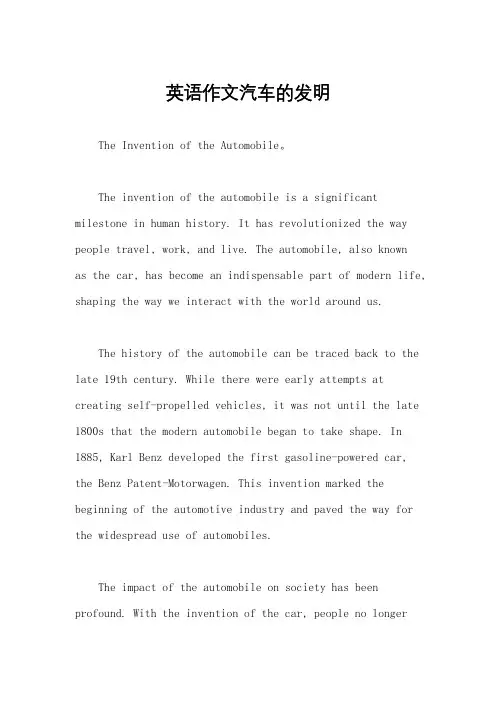
英语作文汽车的发明The Invention of the Automobile。
The invention of the automobile is a significant milestone in human history. It has revolutionized the way people travel, work, and live. The automobile, also knownas the car, has become an indispensable part of modern life, shaping the way we interact with the world around us.The history of the automobile can be traced back to the late 19th century. While there were early attempts at creating self-propelled vehicles, it was not until the late 1800s that the modern automobile began to take shape. In 1885, Karl Benz developed the first gasoline-powered car, the Benz Patent-Motorwagen. This invention marked the beginning of the automotive industry and paved the way for the widespread use of automobiles.The impact of the automobile on society has been profound. With the invention of the car, people no longerhad to rely on horses or other forms of transportation toget around. This newfound mobility allowed for theexpansion of cities and the development of suburbs. It also changed the way people worked, as commuting to work became easier and more efficient. The automobile also played a crucial role in the development of the moderntransportation infrastructure, including the constructionof roads, highways, and bridges.The automobile industry has also had a significant impact on the global economy. The production and sale of cars have created millions of jobs worldwide and have contributed to the growth of many economies. The automotive industry has also driven innovation in technology, leadingto advancements in safety, efficiency, and environmental sustainability.In addition to its economic and social impact, the automobile has also influenced popular culture. Cars have become a symbol of freedom, independence, and status. They have been featured in countless movies, songs, and works of art, and have become an iconic part of the modern lifestyle.Despite its many benefits, the automobile has also posed challenges to society. The widespread use of cars has led to issues such as traffic congestion, air pollution, and dependence on fossil fuels. However, efforts are being made to address these challenges through the development of electric and hybrid vehicles, as well as the implementation of sustainable transportation policies.In conclusion, the invention of the automobile has had a profound and lasting impact on human society. It has transformed the way we live, work, and interact with the world around us. While the automobile has posed challenges, its benefits cannot be denied. As we look to the future, it is important to continue to innovate and develop sustainable solutions that will allow us to continue to enjoy the benefits of the automobile while minimizing its negative impact on the environment and society.。
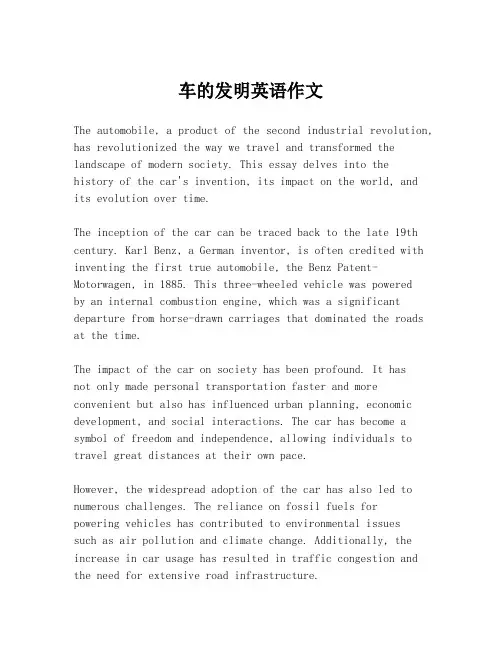
车的发明英语作文The automobile, a product of the second industrial revolution, has revolutionized the way we travel and transformed the landscape of modern society. This essay delves into thehistory of the car's invention, its impact on the world, andits evolution over time.The inception of the car can be traced back to the late 19th century. Karl Benz, a German inventor, is often credited with inventing the first true automobile, the Benz Patent-Motorwagen, in 1885. This three-wheeled vehicle was poweredby an internal combustion engine, which was a significant departure from horse-drawn carriages that dominated the roads at the time.The impact of the car on society has been profound. It hasnot only made personal transportation faster and more convenient but also has influenced urban planning, economic development, and social interactions. The car has become a symbol of freedom and independence, allowing individuals to travel great distances at their own pace.However, the widespread adoption of the car has also led to numerous challenges. The reliance on fossil fuels forpowering vehicles has contributed to environmental issuessuch as air pollution and climate change. Additionally, the increase in car usage has resulted in traffic congestion and the need for extensive road infrastructure.Over the years, the car has undergone significant evolution. From the early models with minimal features to the modern vehicles equipped with advanced technology, the car has become safer, more efficient, and more comfortable. The advent of electric vehicles (EVs) in recent years marks a new era in automotive history, promising a cleaner and more sustainable future for transportation.In conclusion, the invention of the car has been a pivotal moment in human history. It has reshaped our way of life and continues to be a subject of innovation and development. As we look to the future, the challenge lies in creating vehicles that are not only convenient and enjoyable to use but also environmentally friendly and sustainable.。
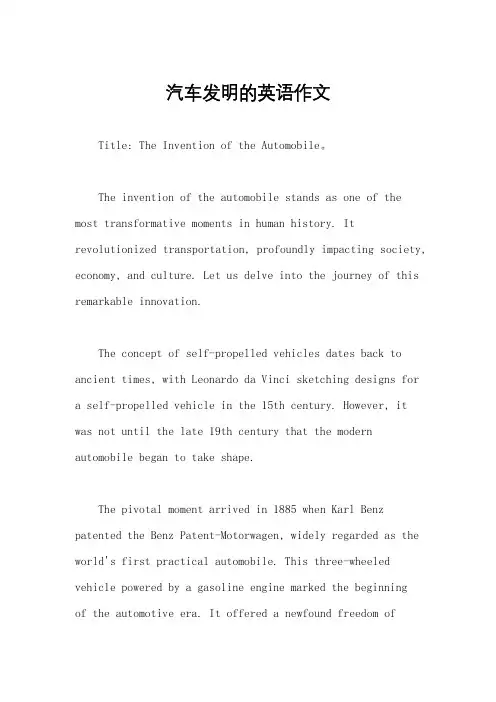
汽车发明的英语作文Title: The Invention of the Automobile。
The invention of the automobile stands as one of the most transformative moments in human history. It revolutionized transportation, profoundly impacting society, economy, and culture. Let us delve into the journey of this remarkable innovation.The concept of self-propelled vehicles dates back to ancient times, with Leonardo da Vinci sketching designs for a self-propelled vehicle in the 15th century. However, it was not until the late 19th century that the modern automobile began to take shape.The pivotal moment arrived in 1885 when Karl Benz patented the Benz Patent-Motorwagen, widely regarded as the world's first practical automobile. This three-wheeled vehicle powered by a gasoline engine marked the beginningof the automotive era. It offered a newfound freedom ofmovement, liberating people from the constraints of distance and time.Benz's invention paved the way for rapid advancementsin automobile technology. Henry Ford's introduction of the assembly line in 1913 revolutionized mass production, making cars more affordable and accessible to the general public. The Ford Model T, introduced in 1908, became a symbol of the automotive revolution, transforming the way people lived and worked.The automobile industry flourished in the 20th century, driving innovation in engineering, design, and manufacturing. From the introduction of electric starters and hydraulic brakes to the development of sleeker designs and more efficient engines, cars evolved rapidly, becoming faster, safer, and more comfortable.The impact of the automobile on society was profound.It reshaped urban landscapes, leading to the construction of highways and suburbs. It transformed the way people commuted to work, traveled for leisure, and conductedbusiness. The rise of the automobile also fueled economic growth, creating jobs in manufacturing, transportation, and service industries.However, alongside its benefits, the automobile also brought about challenges. Concerns about air pollution, traffic congestion, and dependence on fossil fuels emerged as pressing issues. The quest for sustainabletransportation solutions gained momentum, leading to the development of electric and hybrid vehicles, as well as initiatives to improve public transportation infrastructure.Today, the automobile industry stands at the brink of another transformative era. Advances in technology,including artificial intelligence, autonomous driving systems, and alternative fuels, promise to reshape thefuture of transportation once again. Electric vehicles are gaining popularity, driven by concerns about climate change and environmental sustainability.As we look ahead, it is clear that the invention of the automobile was a milestone in human history, marking thebeginning of a new era of mobility. From its humble beginnings in the late 19th century to the present day, the automobile has shaped the way we live, work, and interact with the world around us. As we embrace the challenges and opportunities of the future, let us remember the remarkable journey that began with Karl Benz's visionary invention.。
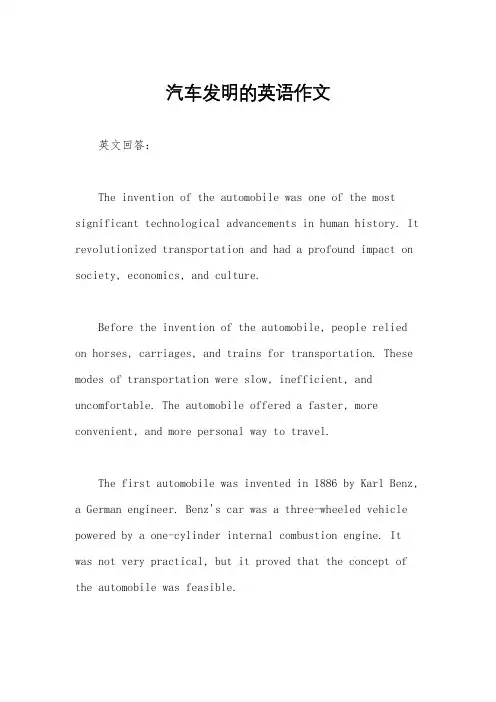
汽车发明的英语作文英文回答:The invention of the automobile was one of the most significant technological advancements in human history. It revolutionized transportation and had a profound impact on society, economics, and culture.Before the invention of the automobile, people relied on horses, carriages, and trains for transportation. These modes of transportation were slow, inefficient, and uncomfortable. The automobile offered a faster, more convenient, and more personal way to travel.The first automobile was invented in 1886 by Karl Benz, a German engineer. Benz's car was a three-wheeled vehicle powered by a one-cylinder internal combustion engine. It was not very practical, but it proved that the concept of the automobile was feasible.In the years that followed, other inventors and engineers worked to improve the automobile. Henry Ford, an American engineer, played a major role in making the automobile affordable and accessible to the masses. In 1908, Ford introduced the Model T, a simple, reliable, and inexpensive car that became the first mass-produced automobile.The automobile quickly became popular around the world. It allowed people to travel longer distances more quickly and easily than ever before. It also made it possible for people to live in suburbs and commute to work in the city. The automobile also had a major impact on the economy. It created new jobs in the automotive industry and related fields. It also stimulated the growth of other industries, such as tourism and road construction.The automobile has had a profound impact on culture. It has changed the way people think about transportation, time, and space. It has also influenced the development of suburbs, shopping malls, and other aspects of modern life.The automobile is not without its critics. Some argue that it has contributed to pollution, traffic congestion, and accidents. However, the benefits of the automobile far outweigh its drawbacks. It has made the world a smaller place and given people more freedom and mobility.中文回答:汽车的发明是人类历史上最重要的技术进步之一。
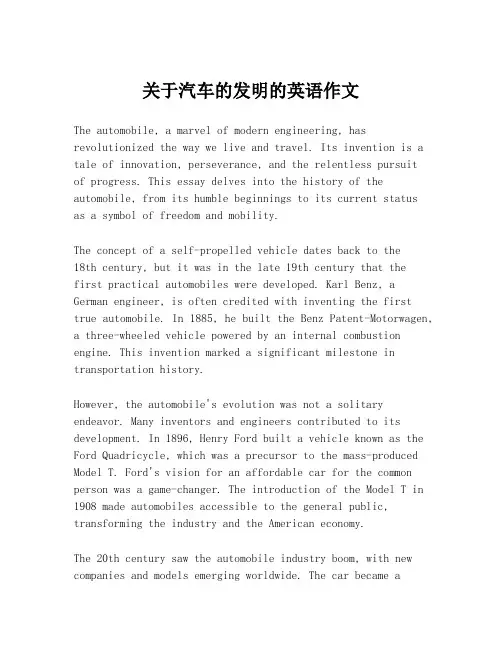
关于汽车的发明的英语作文The automobile, a marvel of modern engineering, has revolutionized the way we live and travel. Its invention is a tale of innovation, perseverance, and the relentless pursuitof progress. This essay delves into the history of the automobile, from its humble beginnings to its current statusas a symbol of freedom and mobility.The concept of a self-propelled vehicle dates back to the18th century, but it was in the late 19th century that thefirst practical automobiles were developed. Karl Benz, a German engineer, is often credited with inventing the first true automobile. In 1885, he built the Benz Patent-Motorwagen, a three-wheeled vehicle powered by an internal combustion engine. This invention marked a significant milestone in transportation history.However, the automobile's evolution was not a solitary endeavor. Many inventors and engineers contributed to its development. In 1896, Henry Ford built a vehicle known as the Ford Quadricycle, which was a precursor to the mass-produced Model T. Ford's vision for an affordable car for the common person was a game-changer. The introduction of the Model T in 1908 made automobiles accessible to the general public, transforming the industry and the American economy.The 20th century saw the automobile industry boom, with new companies and models emerging worldwide. The car became asymbol of status and wealth, and later, a necessity for many households. Technological advancements such as the electric starter, the automatic transmission, and the development ofthe highway system further increased the popularity of automobiles.As we progressed into the 21st century, the focus shifted towards sustainability and environmental concerns. The invention of the electric car, with companies like Tesla leading the charge, has shown that the automobile can be both powerful and eco-friendly. The integration of technology into vehicles has also led to the rise of autonomous driving, promising a future where cars are not just a means of transportation but also a hub for connectivity and innovation.In conclusion, the invention of the automobile has been a transformative force in human history. From its initialdesign to its current state as a symbol of innovation and sustainability, the automobile has come a long way. As we continue to innovate and push the boundaries of what is possible, the automobile stands as a testament to human ingenuity and our unyielding quest for a better tomorrow.。
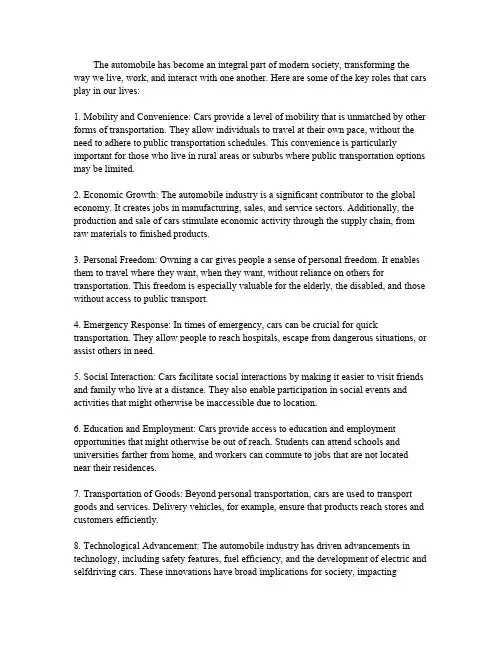
The automobile has become an integral part of modern society,transforming the way we live,work,and interact with one another.Here are some of the key roles that cars play in our lives:1.Mobility and Convenience:Cars provide a level of mobility that is unmatched by other forms of transportation.They allow individuals to travel at their own pace,without the need to adhere to public transportation schedules.This convenience is particularly important for those who live in rural areas or suburbs where public transportation options may be limited.2.Economic Growth:The automobile industry is a significant contributor to the global economy.It creates jobs in manufacturing,sales,and service sectors.Additionally,the production and sale of cars stimulate economic activity through the supply chain,from raw materials to finished products.3.Personal Freedom:Owning a car gives people a sense of personal freedom.It enables them to travel where they want,when they want,without reliance on others for transportation.This freedom is especially valuable for the elderly,the disabled,and those without access to public transport.4.Emergency Response:In times of emergency,cars can be crucial for quick transportation.They allow people to reach hospitals,escape from dangerous situations,or assist others in need.5.Social Interaction:Cars facilitate social interactions by making it easier to visit friends and family who live at a distance.They also enable participation in social events and activities that might otherwise be inaccessible due to location.cation and Employment:Cars provide access to education and employment opportunities that might otherwise be out of reach.Students can attend schools and universities farther from home,and workers can commute to jobs that are not located near their residences.7.Transportation of Goods:Beyond personal transportation,cars are used to transport goods and services.Delivery vehicles,for example,ensure that products reach stores and customers efficiently.8.Technological Advancement:The automobile industry has driven advancements in technology,including safety features,fuel efficiency,and the development of electric and selfdriving cars.These innovations have broad implications for society,impactingeverything from environmental sustainability to the future of work.9.Cultural Impact:Cars have had a profound cultural impact,influencing music,film, and art.They are often associated with freedom,success,and adventure,and have become symbols of personal identity and social status.10.Environmental Concerns:Despite their many benefits,cars also contribute to environmental issues such as air pollution and climate change.This has led to a growing focus on sustainable transportation options,including electric vehicles and carsharing services.In conclusion,automobiles play a multifaceted role in society,impacting our personal lives,the economy,and the environment.As we look to the future,the role of cars is likely to continue evolving,with a focus on sustainability and technological innovation.。
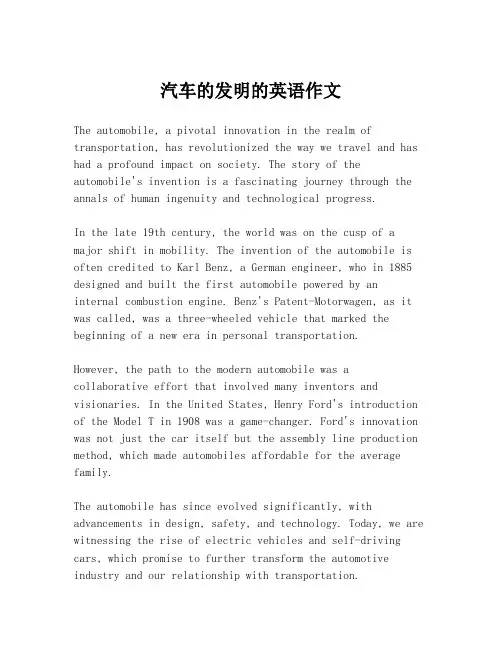
汽车的发明的英语作文The automobile, a pivotal innovation in the realm of transportation, has revolutionized the way we travel and has had a profound impact on society. The story of the automobile's invention is a fascinating journey through the annals of human ingenuity and technological progress.In the late 19th century, the world was on the cusp of a major shift in mobility. The invention of the automobile is often credited to Karl Benz, a German engineer, who in 1885 designed and built the first automobile powered by aninternal combustion engine. Benz's Patent-Motorwagen, as it was called, was a three-wheeled vehicle that marked the beginning of a new era in personal transportation.However, the path to the modern automobile was acollaborative effort that involved many inventors and visionaries. In the United States, Henry Ford's introduction of the Model T in 1908 was a game-changer. Ford's innovation was not just the car itself but the assembly line production method, which made automobiles affordable for the average family.The automobile has since evolved significantly, with advancements in design, safety, and technology. Today, we are witnessing the rise of electric vehicles and self-driving cars, which promise to further transform the automotive industry and our relationship with transportation.The impact of the automobile extends beyond convenience and speed. It has shaped urban planning, influenced economic development, and even affected social and cultural norms. The automobile has become a symbol of freedom and independence, allowing individuals to travel at their own pace and explore the world beyond their immediate surroundings.In conclusion, the invention of the automobile has been a transformative force in modern history. From its humble beginnings to its current status as a cornerstone of global industry, the automobile continues to evolve and inspire. As we look to the future, the ongoing development of this technology holds the promise of even greater innovations and a more connected world.。
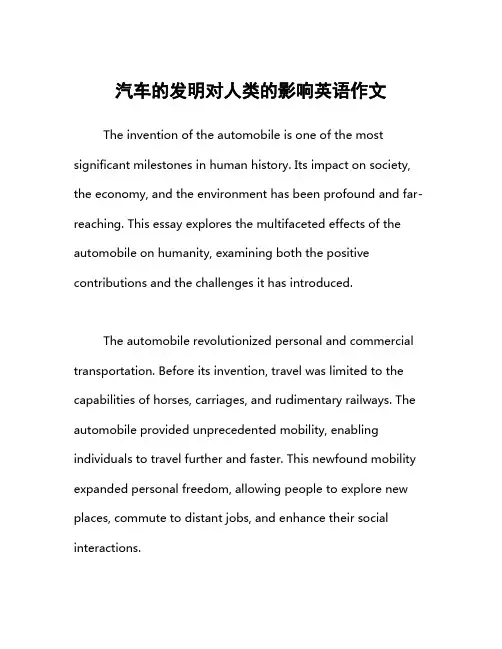
汽车的发明对人类的影响英语作文The invention of the automobile is one of the most significant milestones in human history. Its impact on society, the economy, and the environment has been profound and far-reaching. This essay explores the multifaceted effects of the automobile on humanity, examining both the positive contributions and the challenges it has introduced.The automobile revolutionized personal and commercial transportation. Before its invention, travel was limited to the capabilities of horses, carriages, and rudimentary railways. The automobile provided unprecedented mobility, enabling individuals to travel further and faster. This newfound mobility expanded personal freedom, allowing people to explore new places, commute to distant jobs, and enhance their social interactions.In urban areas, cars facilitated the development of suburbs, enabling people to live farther from their workplaces. This suburban expansion led to the growth of residential areas and contributed to the evolution of modern cities. For rural communities, automobiles improved access to essential services such as healthcare, education, and markets, fostering economic growth and enhancing quality of life.The automobile industry has been a cornerstone of economic growth and industrialization. The mass production techniques pioneered by Henry Ford revolutionized manufacturing, making cars affordable and accessible to the average person. This industrial boom created millions of jobs, not only in automobile manufacturing but also in related industries such as steel, rubber, glass, and petroleum.The ripple effects of the automobile industry spurred economic development across various sectors. The construction of roads, highways, and bridges created extensive infrastructureprojects, boosting employment and stimulating economic activity. The rise of the automotive industry also led to the growth of ancillary services such as repair shops, gas stations, and dealerships, further contributing to economic prosperity.The automobile has had a profound influence on social and cultural dynamics. It has transformed the way people interact, socialize, and experience the world. The freedom to travel by car has facilitated family vacations, road trips, and leisure activities, fostering a culture of exploration and adventure. Cars have become symbols of status, freedom, and personal identity, playing a significant role in shaping social norms and cultural values.Moreover, the automobile has influenced the design and layout of cities. The need for parking spaces, road networks, and traffic management systems has shaped urban planning and architecture. Car ownership has also affected lifestyles, with theconvenience of personal transportation influencing shopping habits, dining preferences, and recreational activities.While the automobile has brought numerous benefits, it has also posed significant environmental challenges. The widespread use of cars has led to increased air pollution, contributing to respiratory problems and environmental degradation. The emission of greenhouse gases from vehicles is a major contributor to climate change, posing a serious threat to the planet’s ecological balance.The reliance on fossil fuels has also raised concerns about resource depletion and energy sustainability. Efforts to mitigate these environmental impacts have led to the development of cleaner and more efficient technologies, such as electric and hybrid vehicles. The push for sustainable transportation solutions highlights the ongoing need to balance the benefits of automobile use with environmental stewardship.The proliferation of automobiles has brought about both improvements and challenges in terms of safety and public health. On one hand, cars have made transportation safer and more convenient, reducing the risks associated with horse-drawn carriages and other primitive modes of travel. Advances in automotive safety technology, including seat belts, airbags, and anti-lock braking systems, have significantly reduced fatalities and injuries in accidents.On the other hand, the increase in the number of vehicles on the road has led to a rise in traffic accidents and fatalities. Road safety remains a critical issue, necessitating continuous improvements in vehicle design, driver education, and traffic management systems. Additionally, the sedentary lifestyle associated with car dependence has contributed to health problems such as obesity and cardiovascular diseases.The automobile industry has been a driving force behind technological innovation. The quest for better performance,safety, and efficiency has spurred advancements in engineering, materials science, and computer technology. Modern cars are equipped with sophisticated features such as GPS navigation, automated driving systems, and advanced infotainment options, reflecting the rapid pace of technological progress.Looking ahead, the future of the automobile holds exciting possibilities. The development of autonomous vehicles promises to revolutionize transportation by enhancing safety, reducing traffic congestion, and improving accessibility for all individuals, including those with disabilities. The integration of artificial intelligence and connectivity in cars is expected to create smarter and more efficient transportation networks.The invention of the automobile has indelibly shaped human civilization. Its impact on mobility, the economy, society, and the environment has been profound and multifaceted. While the automobile has brought unparalleled benefits, it has also introduced challenges that require careful considerationand innovative solutions. As we navigate the future of transportation, it is essential to harness the advantages of the automobile while addressing its environmental and social implications. Through continued innovation and sustainable practices, we can ensure that the legacy of the automobile remains a positive force for humanity.。
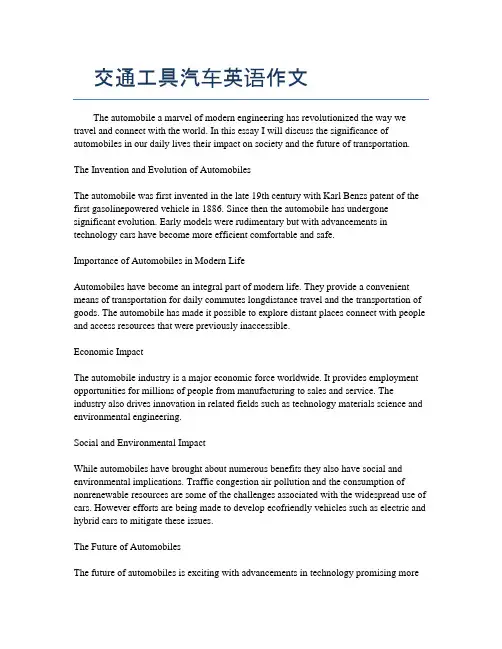
交通工具汽车英语作文The automobile a marvel of modern engineering has revolutionized the way we travel and connect with the world. In this essay I will discuss the significance of automobiles in our daily lives their impact on society and the future of transportation.The Invention and Evolution of AutomobilesThe automobile was first invented in the late 19th century with Karl Benzs patent of the first gasolinepowered vehicle in 1886. Since then the automobile has undergone significant evolution. Early models were rudimentary but with advancements in technology cars have become more efficient comfortable and safe.Importance of Automobiles in Modern LifeAutomobiles have become an integral part of modern life. They provide a convenient means of transportation for daily commutes longdistance travel and the transportation of goods. The automobile has made it possible to explore distant places connect with people and access resources that were previously inaccessible.Economic ImpactThe automobile industry is a major economic force worldwide. It provides employment opportunities for millions of people from manufacturing to sales and service. The industry also drives innovation in related fields such as technology materials science and environmental engineering.Social and Environmental ImpactWhile automobiles have brought about numerous benefits they also have social and environmental implications. Traffic congestion air pollution and the consumption of nonrenewable resources are some of the challenges associated with the widespread use of cars. However efforts are being made to develop ecofriendly vehicles such as electric and hybrid cars to mitigate these issues.The Future of AutomobilesThe future of automobiles is exciting with advancements in technology promising moresustainable and intelligent forms of transportation. Autonomous vehicles connected car technology and improved battery technology for electric cars are some of the innovations that are set to transform the automotive landscape.Learning to Drive and Road SafetyLearning to drive is a rite of passage for many symbolizing independence and mobility. It is important for drivers to be welltrained and aware of road safety rules to prevent accidents and ensure a safe driving environment for all.ConclusionIn conclusion automobiles have transformed the way we live and work. They have brought people and places closer together facilitated economic growth and spurred technological innovation. As we look to the future it is crucial to address the environmental and social challenges associated with automobiles while continuing to embrace the benefits they provide.This essay has highlighted the multifaceted role of automobiles in our lives. From their inception to their current status as a staple of modern society automobiles continue to evolve reflecting our needs aspirations and technological progress.。
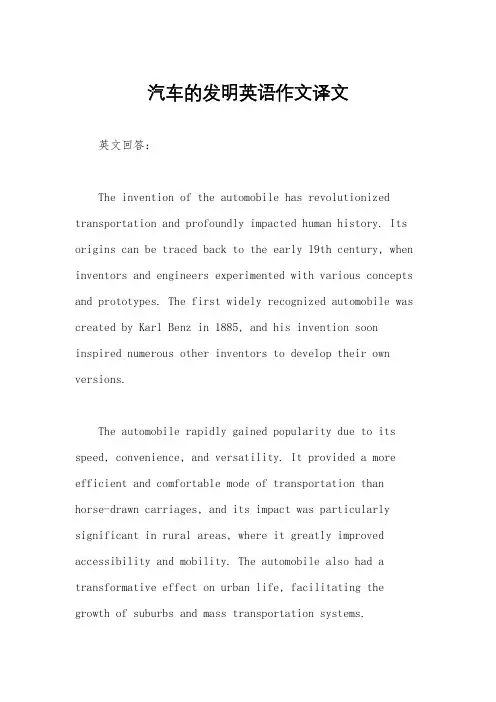
汽车的发明英语作文译文英文回答:The invention of the automobile has revolutionized transportation and profoundly impacted human history. Its origins can be traced back to the early 19th century, when inventors and engineers experimented with various concepts and prototypes. The first widely recognized automobile was created by Karl Benz in 1885, and his invention soon inspired numerous other inventors to develop their own versions.The automobile rapidly gained popularity due to its speed, convenience, and versatility. It provided a more efficient and comfortable mode of transportation than horse-drawn carriages, and its impact was particularly significant in rural areas, where it greatly improved accessibility and mobility. The automobile also had a transformative effect on urban life, facilitating the growth of suburbs and mass transportation systems.However, the early automobiles were far from perfect. They were often unreliable, uncomfortable, and difficult to drive. They also posed significant safety hazards, both to the occupants and to pedestrians and other road users. Over time, numerous technological advancements were made to address these shortcomings. The adoption of the internal combustion engine and the development of electric starters and transmissions made the automobile more practical and user-friendly. Safety features, such as seat belts, airbags, and anti-lock brakes, were also implemented to enhance passenger safety.The automobile industry also underwent a period ofrapid growth and consolidation in the early 20th century. A handful of major manufacturers emerged, such as Ford, General Motors, and Chrysler, and they established dominance through mass production and assembly line techniques. The automobile became increasingly affordable and accessible to the general public, and its impact on society continued to grow.In the latter half of the 20th century, the automobile became even more sophisticated and technologically advanced. The introduction of computers and electronics enabled the development of advanced safety systems, fuel-efficient engines, and autonomous driving capabilities. Theautomobile also became an important component of the global economy, and its production and sale became a majorindustry in many countries.Today, the automobile remains an indispensable part of modern society. It is used for a wide variety of purposes, including transportation, recreation, and commerce. The automobile has also had a profound impact on culture, influencing everything from music to film to fashion.中文回答:汽车的发明彻底改变了交通运输方式,并对人类历史产生了深远的影响。
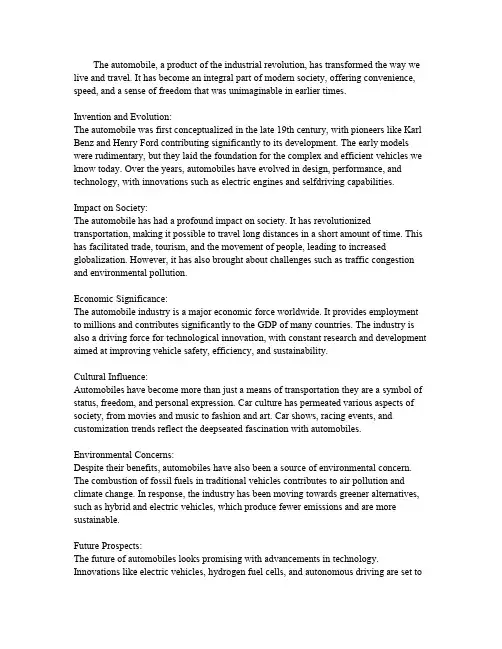
The automobile,a product of the industrial revolution,has transformed the way we live and travel.It has become an integral part of modern society,offering convenience, speed,and a sense of freedom that was unimaginable in earlier times.Invention and Evolution:The automobile was first conceptualized in the late19th century,with pioneers like Karl Benz and Henry Ford contributing significantly to its development.The early models were rudimentary,but they laid the foundation for the complex and efficient vehicles we know today.Over the years,automobiles have evolved in design,performance,and technology,with innovations such as electric engines and selfdriving capabilities. Impact on Society:The automobile has had a profound impact on society.It has revolutionized transportation,making it possible to travel long distances in a short amount of time.This has facilitated trade,tourism,and the movement of people,leading to increased globalization.However,it has also brought about challenges such as traffic congestion and environmental pollution.Economic Significance:The automobile industry is a major economic force worldwide.It provides employment to millions and contributes significantly to the GDP of many countries.The industry is also a driving force for technological innovation,with constant research and development aimed at improving vehicle safety,efficiency,and sustainability.Cultural Influence:Automobiles have become more than just a means of transportation they are a symbol of status,freedom,and personal expression.Car culture has permeated various aspects of society,from movies and music to fashion and art.Car shows,racing events,and customization trends reflect the deepseated fascination with automobiles.Environmental Concerns:Despite their benefits,automobiles have also been a source of environmental concern. The combustion of fossil fuels in traditional vehicles contributes to air pollution and climate change.In response,the industry has been moving towards greener alternatives, such as hybrid and electric vehicles,which produce fewer emissions and are more sustainable.Future Prospects:The future of automobiles looks promising with advancements in technology. Innovations like electric vehicles,hydrogen fuel cells,and autonomous driving are set toredefine transportation.The focus is shifting towards creating vehicles that are not only efficient and safe but also environmentally friendly.Conclusion:The automobile has come a long way since its inception and continues to be a dynamic and evolving aspect of human life.As we look to the future,the challenge lies in balancing the need for personal mobility with the imperative to protect our environment and ensure sustainable development.The automobile industrys response to these challenges will shape the way we travel for generations to come.。
关于汽车的英语作文英文回答:The automobile has revolutionized human transportation and has become an indispensable part of our daily lives. It has impacted society in numerous ways, from economic development to social interactions, and has played apivotal role in shaping modern civilization.Economic Development:The automotive industry is one of the largest and most important in the world, contributing trillions of dollars to global GDP and employing millions of people directly and indirectly. The production, sale, and maintenance of vehicles generate significant revenue and drive economic growth.Social Impact:Automobiles have enabled greater mobility, allowing people to travel longer distances for work, leisure, and social gatherings. This increased connectivity has facilitated the exchange of ideas, fostered relationships, and expanded horizons.Environmental Impact:While automobiles provide convenience and flexibility, their environmental impact cannot be overlooked. Vehicle emissions contribute to air pollution, greenhouse gas emissions, and climate change. Governments and manufacturers are actively working to reduce emissions through regulations, fuel-efficient technologies, and alternative propulsion systems.Technological Advancements:The automotive industry has been at the forefront of technological advancements. From the internal combustion engine to autonomous driving systems, the automobile has undergone constant innovation. These technologicaladvancements have improved safety, efficiency, and the overall driving experience.Cultural Impact:Automobiles have become deeply embedded in our culture. They are often seen as symbols of status, freedom, and individuality. Car shows, races, and rallies attract millions of enthusiasts worldwide, showcasing the passion and engineering prowess that goes into automotive design and performance.Future of Automobiles:The future of automobiles is rapidly evolving with the rise of electric vehicles, autonomous driving, and connected car technologies. These advancements promise to further transform transportation, addressing environmental concerns, enhancing safety, and creating new mobility solutions.中文回答:汽车。
theautomobile英语作文The automobile has been a symbol of human innovation and progress since the late 19th century. It has transformed the way we live, work, and travel, becoming an integral part of modern society. This essay will explore the evolution of the automobile, its impact on the environment and culture, and the future of personal transportation.The birth of the automobile can be traced back to the invention of the internal combustion engine, which paved the way for the first practical cars. Early pioneers like Karl Benz and Henry Ford contributed significantly to the development of the automobile, with Ford's assembly line production method making cars affordable for the masses.Over the decades, automobiles have undergone significant changes. From the simple, boxy designs of early models to the sleek, aerodynamic shapes of today's vehicles, the aesthetic evolution of the car reflects the changing tastes and technological advancements of each era. Safety features have also improved dramatically, with innovations like seat belts, airbags, and advanced braking systems saving countless lives.The automobile has had a profound impact on society. It has facilitated the growth of suburbs, reshaped urban landscapes, and enabled greater personal freedom. However, it has also contributed to environmental issues such as air pollution and climate change. The burning of fossil fuels in internalcombustion engines releases greenhouse gases, leading to a global push for cleaner, more sustainable transportation solutions.In response to these challenges, the automotive industry is undergoing a significant shift towards electric vehicles (EVs). EVs offer the promise of reduced emissions and a more sustainable future. Companies like Tesla have led the charge in popularizing electric cars, and traditional automakers are following suit with their own electric models.The future of the automobile is likely to be shaped by advancements in technology. Self-driving cars, for instance, are no longer the stuff of science fiction but are being tested on roads worldwide. These autonomous vehicles have the potential to further transform transportation by reducing accidents, easing traffic congestion, and providing new mobility options for those who cannot drive.In conclusion, the automobile has come a long way since its inception. It has revolutionized personal transportation and continues to evolve with the times. As we look to the future, the focus is on sustainability, safety, and innovation, with the promise of a cleaner, smarter, and more connected driving experience.。
汽车的发明的英语作文The invention of the automobile has completely revolutionized the way we live and travel. It has brought about a new level of convenience and freedom, allowing people to travel long distances in a relatively short amount of time.Cars have become an integral part of modern society, providing a means of transportation for millions of people around the world. They have also had a significant impact on the economy, creating jobs and stimulating the growth of various industries such as manufacturing, oil, and gas.The invention of the automobile has also had a profound impact on the environment. While cars have provided unparalleled convenience, they have also contributed to air and noise pollution, as well as the depletion of natural resources.Despite these drawbacks, the automobile has undoubtedlychanged the world for the better. It has connected people and places in ways that were once unimaginable, and has paved the way for countless technological advancements in the automotive industry.The future of the automobile is an exciting and ever-evolving prospect. With the development of electric and self-driving cars, we are on the brink of a new era in transportation that promises to be safer, more efficient, and more environmentally friendly than ever before.。
汽车带来的危害英语作文The automobile,a symbol of modernization and progress,has revolutionized the way we live and travel.However,this remarkable invention has also brought numerous harmful effects that impact our environment,health,and society.Firstly,automobiles contribute significantly to air pollution.The exhaust emissions from vehicles contain harmful gases such as carbon monoxide,nitrogen oxides,and particulate matter.These emissions not only contribute to global warming but also cause respiratory diseases and other health problems.Furthermore,vehicle emissions can form smog,which reduces visibility and adds to the already congested urban landscapes.Secondly,automobiles lead to noise pollution.The constant honking of horns,the revving of engines,and the rumbling of tires on the road create a constant and often unbearable noise.This noise not only disrupts the peace and tranquility of our neighborhoods but can also contribute to hearing loss and stress-related health issues.Moreover,automobiles have a negative impact on our cities'infrastructure.With the increasing number of vehicles on the road,there is a growing need for more roads,parkingspaces,and maintenance.This results in the loss of green spaces,increased congestion,and a strain on public resources.Additionally,automobiles contribute to traffic accidents,which claim thousands of lives every year.These accidents not only result in physical injuries and property damage but also cause emotional trauma and financial burden on families and communities.In conclusion,while automobiles have brought many conveniences to our lives,they have also caused numerous harmful effects.It is crucial that we recognize these effects and take measures to mitigate them,such as promoting public transportation,encouraging active transportation modes like cycling and walking,and developing more sustainable and environmentally friendly vehicles.。
介绍汽车发明作文英语作文The Invention of the Automobile。
The invention of the automobile was a significant milestone in human history. It revolutionized the way people travel and transport goods, and it has had a profound impact on the economy, society, and culture of the world. In this essay, we will explore the history of the automobile and its impact on the world.The history of the automobile dates back to the 18th century, when the first steam-powered vehicle was invented. However, it wasn't until the late 19th century that thefirst gasoline-powered automobile was developed. In 1885, Karl Benz invented the first gasoline-powered car, which he called the Benz Patent-Motorwagen. This vehicle had three wheels and was powered by a single-cylinder engine.Over the next few decades, many other inventors and engineers worked to improve upon Benz's design, and by theturn of the century, automobiles were becoming more common on the roads. In 1908, Henry Ford introduced the Model T, which was the first mass-produced automobile. This vehicle was affordable and reliable, and it quickly became popular among the middle class.The impact of the automobile on society was profound. It allowed people to travel farther and faster than ever before, which helped to break down geographic barriers and bring people closer together. It also created new industries, such as the automotive industry, which provided jobs and economic growth.However, the automobile also had negative effects on the environment and public health. The emissions from cars contribute to air pollution, which can cause respiratory problems and other health issues. Additionally, the widespread use of automobiles has led to increased traffic congestion and accidents.In recent years, there has been a growing interest in alternative modes of transportation, such as electric carsand public transit. These innovations have the potential to reduce the negative impact of automobiles on the environment and public health.In conclusion, the invention of the automobile was a significant milestone in human history. It revolutionized the way people travel and transport goods, and it has had a profound impact on the economy, society, and culture of the world. However, it is important to recognize the negative effects of automobiles and work towards creating more sustainable and environmentally-friendly modes of transportation.。
The Automobile: A Catalyst for Modern Life ImprovementThe automobile, a technological marvel of the industrial revolution, has transformed modern life in profound and far-reaching ways. It has revolutionized transportation, altered the landscape of cities and towns, and given rise to new industries and economies. The impact of the automobile on modern life is vast and multifaceted, shaping our society in ways that are both visible and invisible.At the heart of the automobile's influence lies its ability to revolutionize transportation. Prior to the widespread availability of automobiles, people were largely dependent on horses, carriages, and public transportation for long-distance travel. The automobile provided a personal and convenient mode of transportation that allowed individuals to traverse vast distances quickly and independently. This freed people from the constraints of fixed travel routes and schedules, greatly expanding their horizons and opportunities.The automobile's impact on urban and rural landscapes is also significant. Cities grew rapidly as suburbs and commuter belts emerged, allowing residents to live farther away from their workplaces while still commuting conveniently. This decentralization of population had profound effects on theurban economy, infrastructure, and social structure. Rural areas also benefited from the automobile's arrival, as farmers and ranchers could now transport their goods to market more efficiently, opening up new economic opportunities.The automobile industry has also given rise to a vast array of ancillary industries and economies. The manufacturing of automobiles requires a complex supply chain of raw materials, components, and sub-systems, supporting a diverse range of jobs in areas such as metallurgy, plastics manufacturing, and electronics. Additionally, the automotive sector generates significant revenue through sales, maintenance, and repairs, contributing significantly to the global economy.Moreover, the automobile has had a profound impact on social and cultural life. It has enabled people to engage in new activities and forms of entertainment, such as road trips and automotive sports. Automobile clubs and enthusiasts have formed communities centered around shared interests in cars and driving, fostering a unique automotive culture. The automobile has also become a symbol of status and individuality, reflecting people's tastes, preferences, and lifestyles.However, it is important to acknowledge that theautomobile has not come without costs and challenges. Traffic congestion, air pollution, and the depletion of natural resources are just a few of the environmental and societal issues that have arisen from the widespread use of automobiles. Nevertheless, the automobile remains a crucial part of modern life, and efforts are being made to address these challenges through technological advancements and sustainable practices.In conclusion, the automobile has significantly improved modern life by revolutionizing transportation, altering urban and rural landscapes, and giving rise to new industries and economies. Its impact is felt in every aspect of society, from the way we travel and work to the way we entertain and socialize. While the automobile has brought challenges, it remains an integral part of our modern world, and its influence is likely to continue into the future.。
英语作文范文
范文:The Automobile
「要求」
汽车自发明以来,已成为人们生活中不可缺少的一部分。
请你以下面三句话分别作为三段段首的主题句,写一篇关于汽车的文章。
The automobile is constantly improved.
The speed of the automobile can be of great advantage in time of emergency.
On the other hand, the automobile can cause damage because of the violation of driving regulations.
「范文」
The Automobile
The automobile is constantly improved. Man has given his talents to full play in designing and perfecting all kinds of automobiles. Old-fashioned types are replaced by new ones,which are faster, more energy-saving. more enduring and more comfortable. The engine, the wheels, the body, the tires and the inner furnishing have all undergone much improvement.
The speed of the automobile can be of great advantage in time of emergency. When a hospital receives an urgent call,its ambulance dashes to the sick or the wounded person. It carries him to the hospital before it is too late to save his life. Being informed of a crime, the police drive to the spot to subdue the criminal. When a building is on fire, the fire engine runs at a high speed to put out the fire.
Life doesn’t give itself to one who tires to keep all its advantage at once.
On the other hand, the automobile can cause damage because of the violation of traffic regulations . It is not a rare happening that two cars collide on the motor way and the drivers get killed. It is often reported that a truck overrides a child or throws down a bicyclist. The most dreadful is the accident that a bus falls down a steep hill with all passengers falling victims to the tragedy.
「评语」
本文根据所给的主题句展开段落。
第一段写汽车在许多方面都得到了改进。
第二段举例陈述了汽车在紧急时刻的作用。
第三段举例说明了由于违章驾驶汽车所造成的危害。
全篇文理通顺,论据充足,语言明白易懂。